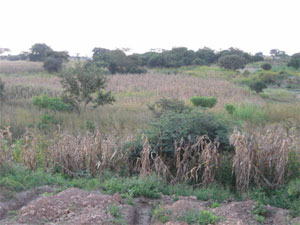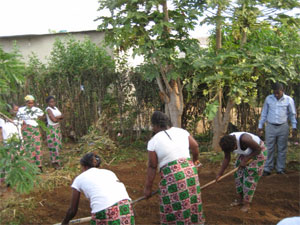MDG: Promote gender equality and empower women
Help instill in women a sense of self-reliance and independence.
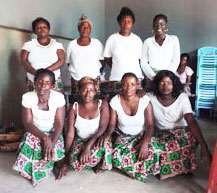 UNFF strives to empower a self-reliant attitude amongst the women, which will last indefinitely. The women benefit from taking on responsibilities and taking care of their own families.
UNFF strives to empower a self-reliant attitude amongst the women, which will last indefinitely. The women benefit from taking on responsibilities and taking care of their own families.
Country-wise Projects
India
Skills Training – Tailoring
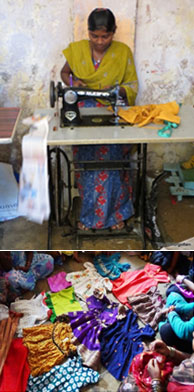
As of February 2015, The UNFF has facilitated the creation of 3 Self Help Groups (SHG) in the wastepicker slums of Pune, India. Each SHG is made up of 10 mothers who are wastepickers and has nominated a president and treasurer.
Each SHG was allowed to choose what types of skills training they would prefer to learn. Many of the women expressed a desire to learn tailoring, so UNFF arranged for the women to attend a tailoring course. This three-month “basic tailoring course” was conducted at the Panmala Community Center in Pune, India and was provided by the Indian government’s Human Resource Development Ministry’s agency Jan Shikshan Sansthan. Dining for Women (DFW) grant funds were used to pay for the course expenses (such as supplies and instructors).
Each of the women completed the course successfully where they learned basic tailoring techniques, including how to take measurements, stitch clothes for infants, dresses for girls and simple types of blouses for ladies. At the end of the course, an evaluation was done by the agency and each woman received a certificate of completion.
For more information about our India Chapter, please visit our India section.
Zambia
Business Training & Establishment of a “Rainy Day” Fund
The mothers in our program in Lusaka, Zambia are given business training in the field of their interest. They graduate with the ability to support their children’s secondary education needs. Some women have learned how to make jewelry.
The women have developed a self-help attitude. With the help and guidance of the project assistant, Kangwa Chewe, the group has raised a “rainy day” fund for times of difficulty. Initially, the goal was to help pay for funerals and health issues, but it has grown and is a major source of support for the women’s families. From their own resources the women each contribute K10 a month. Through their own savings the women have been able to accomplish several things including:
- Buying school uniforms for their children. In the past UNFF had purchased uniforms for the children.
- Purchasing cooking utensils to be used for the school feeding program where the mothers themselves cook for their children. At the onset of the project, UNFF had purchased these items.
- Provided for health and funeral expenses faced by members of the group.
Recently, the Self Help Group in Chingwere held elections to select a new president, vice president, treasurer, secretary, agricultural lead, education lead and school feeding lead.
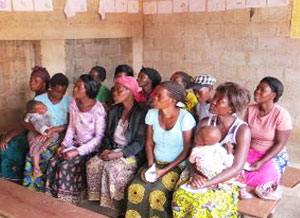
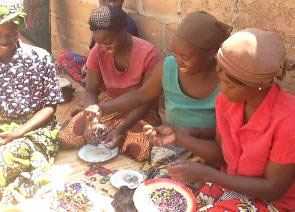
Cookstoves
It seems too good to be true. A technology that improves indoor air quality, saves money and reduces the emissions that are causing climate change. Even better, it is simple and inexpensive. Early this year we introduced this technology to the families we assist in Chingwere, Zambia. During our visit in January, Ramé Hemstreet, Capital Projects Director, brought along a high efficiency cookstove and left it for the women to try out. Subsequently Rabecca Musonda-Machiya, UNFF’s Country Director, and our local volunteer Dorien Van Halperin arranged for a demonstration, comparing the amount of charcoal needed to prepare the local staple nshima – a thick porridge made from maize flour and water – using the typical method as compared to a cookstove. In April the women gathered to have a cooking demonstration to compare traditional charcoal cookers with the high efficiency cookstove.
The minimal yearly costs for charcoal with a traditional cooker is 1825 Kwacha; If the women cook with a high efficiency cookstove the minimal yearly costs will be about 550 kwacha.
The women were enthusiastic about the high efficiency cooker because it uses much less charcoal. The fact that it takes longer to prepare the meal is not an issue, as they can start earlier with the cooking. And, the higher efficiency means that less gases are emitted, reducing negative impacts to both human health and the environment.
However, a high efficiency cookstove costs about 500 kwacha in Zambia, as opposed to 25 kwacha for a traditional cooker. While the women cannot afford the $50 needed to purchase a stove, they are all willing to sign contracts to repay the cost using the charcoal savings. So, we are now purchasing a cookstove for each of the 27 families that we assist in Chingwere. Their subsequent repayments will go into the working capital fund for the agricultural cooperative we have helped the women create. Through these simple, straightforward means families that once survived off the refuse in the Chingwere trash dump are becoming self sufficient.
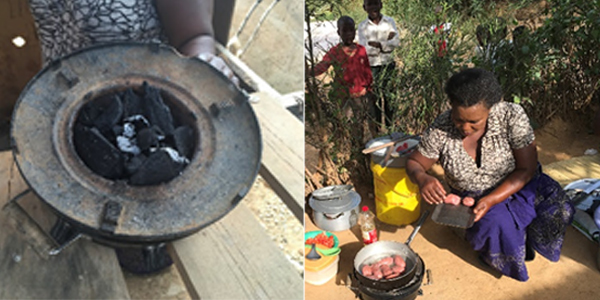
For more information about our Zambia Chapter, please visit our Zambia section.
Sierra Leone
Wi Yone Moni Project
The Wi Yone Moni project is designed to empower women and end generational poverty. The mothers in the Kingtom and Kissy dumpsites have little skills to be self-sufficient or reliant, and their lack of education and skill set prevents them from gaining access to economic opportunities that can uplift them out of poverty. Individual capacity among women/mothers in slum communities in the Western Area of Sierra Leone to establish credit and develop self-sufficient businesses remains a serious problem. Most of these women live below poverty line, are illiterate/semi-illiterate, and lack assets such as; petty trading shops, housing, tailoring shops, pigs, goats, sheep, etc. in these communities. Banks and financial institutions will not provide loans, so often their only choice is to get a loan from a local money-lender, who usually charges outrages interest rates. Often such debts cannot be paid off in time, and the individual or the family gets in deeper poverty. The situation is especially poor for the single mothers or women, because they have often little or no economic status, and especially when there is no husband, they face severe financial hardship.
To change this UNFF-SL, is implementing a women’s self-help group program called Wi Yone Moni project. About one hundred women will be involved in one of our four Self Help Groups. We anticipate many of our beneficiaries will be involved in small business that will be sustainable for their livelihoods. Implementing the Wi Yone Moni program in the dumpsites will drastically improve their economic situations, their health, their living conditions, and most importantly their prospects for the future; breaking generational poverty and allowing these women to enjoy the simple benefits of living as a part of a modern society.
We have partnered with Ecobank Microfinance Sierra Leone Limited (Ecobank); a local Sierra Leone based Micro-Finance Institutions to provide financial services that will bridge the financial literacy and access gap experienced by women. We have also partnered with the Women’s Vocational Training Centre (WVTC) in Freetown, Sierra Leone to provided vocational training for women who are interested in developing skill sets. The WVTC instills in the women the culture of self-reliance and economic independence.
Our objectives are:
- Establishing a saving and loan community
- Developing capacity and skills sets for Self Help Group management
- Providing access to vocational training
- Promoting gender equality and women empowerment

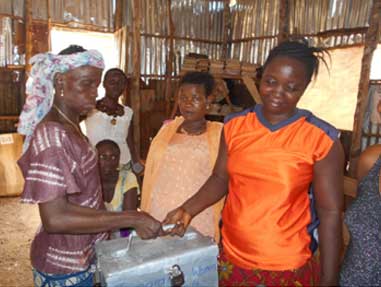
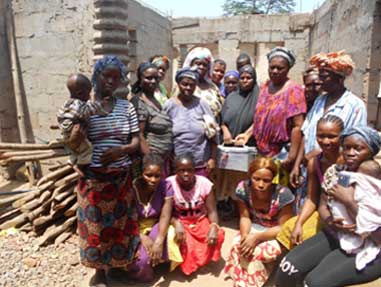
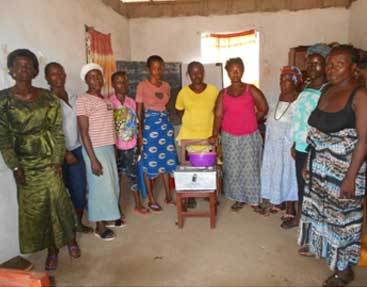
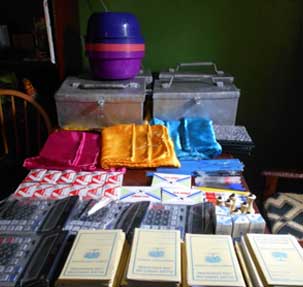
For more information about our Sierra Leone Chapter, please visit our Sierra Leone section.
Capital Projects
Agriculture Project in Chingwere, Zambia
Raising pigs, chickens and some crops can be a very good business in Zambia. Land is quite fertile, and the climate ideal. At the suggestion of the women in the Self Help Group in Chingwere, Zambia, UNFF is in the process of implementing a long-term agriculture project. In 2014, UNFF purchased a 50m x 20m plot of land to be cultivated and maintained by the women. The plans for this land include erecting a pigsty and a chicken run. Pork and poultry products are highly lucrative in Zambia. Eventually the women will rear a minimum of 200 chickens at a time as well as maintain one male pig and three female pigs, which will reproduce piglets for sale. The rest of the land will be used for growing vegetables and other produce that the women can use to feed their families as well as sell at a profit in local markets.
The charity was able to enlist the help of an Agriculture specialist, Mr. Shawa, who is employed by the Zambian Ministry of Agriculture. Mr. Shawa has vast experience in training communities and has been a tremendous help to the women.
To date, the women have planted onion and Chinese cabbage on the agricultural plot. With the onset of rains, there are plans to plant maize as well.
The construction of the pigsty is now almost complete. It has 6 different compartments. The team and women in Zambia are excited about the progress that has been made. The roofing is done and the process of plastering the walls is underway.
The completion of the agricultural project will be an enormous accomplishment for the women in Zambia, and the beginning to a self-sustaining future.
